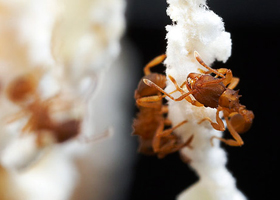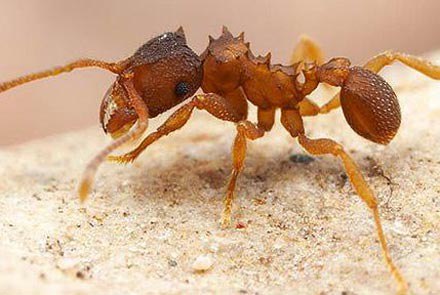The ant ants all
It is often said that in insects, the gods usually only breed when necessary. At that time, a whole bunch of males raced to fertilize the god. But recently, American and Brazilian scientists have found that in the ants Mycocepurus smithii reproduce without fertilization, the male is 'discarded' and does not exist at all.
Discovered ants ants
" Non-sex animals (asexual) are very rare, so this is a very interesting phenomenon to study," said biologist Christian Rabelling, University of Texas at Austin (USA). "They don't mix genes through recombination, so they don't have harmful mutations and can lead to extinction. In general, they're very stable during evolution."

Ants Mycocepurus smithii.(Photo: nationalgeographic.com)
Studies of ants smithii have shown that they are non-gender, so careful examination of the male ants found in Brazil in the 1960s is often documented as M. smithii and has In fact, these specimens belong to another very close species, ant, that grows Mycocepurus obsoletus .
Rabelling also performed the M. smithii reproductive ant ants in Brazil and found that their sperm-containing organs were completely empty. Combined with previous studies on ants, Rabelling and his colleagues concluded that this species is really non-sex.
He also said that he is using genetic markers to study evolution and classify the fungal ants and this will help him determine the date of non-sex reproduction .
Asexual reproduction (no mating) is a common phenomenon in the ant world, but this is the first time scientists have found a species without a male. Some ants still produce males from unfertilized eggs, but 'producing' females from such eggs is extremely rare.

'Sexual reproduction (having mating) brings great benefits to the next generation thanks to the combination of genes. The more diverse your genetic resources are, the more likely you are to cope with diseases and parasites. In a group of asexual ants, if an individual is attacked by a parasite, all members of the nest will also be infected. If you are created by that method, you won't be able to live long , 'explains Laurent Keller, an insect specialist at the University of Lausanne (USA).
Professor Keller also points out that social insects, like ants, can quickly adapt to asexual reproduction because it allows queens to control the gender of all the 'people' in the herd.
- Discover strange ants in the world
- Strange things about the ant world
- Why ants 'dominate' the world
- This is what happens when an ant bites you, no wonder it hurts so much
- Video: The ants are robbing the eggs of the same kind to raise and make
- Mysterious ants 'click' midnight bell
- Ants have known 'cultivation' since ... 60 million years ago
- Colonial colonial behavior changes after winning
- Experience of preventing and treating ants in three burning chambers
- England: Discovering ants is likely to cause house fires
- Some similarities between ants and people we don't know yet
- The mysteries of Argentinian ants are aggressive
 Why do potatoes have eyes?
Why do potatoes have eyes? 'Tragedy' the world's largest carnivorous life: Death becomes ... public toilet
'Tragedy' the world's largest carnivorous life: Death becomes ... public toilet Tomatoes were once considered 'poisonous' for 200 years
Tomatoes were once considered 'poisonous' for 200 years Detecting microscopic parasites on human face
Detecting microscopic parasites on human face